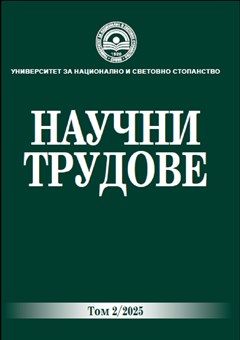The Mechanism of the Impact of Political Institutions on the Efficiency of the Economy in the Study of the 2024 Nobel Laureates in Economics D. Acemoglu, S. Johnson and J. Robinson
Автор: Neda Muzho
Резюме
The main goal of our study is to make a comparative analysis of the revealed mechanisms and dependencies between political institutions and the economic environment in the countries analyzed by Nobel laureates Acemoglu, Johnson and Robinson and the validity of their conclusions in Bulgarian conditions of transition from a command to a market economy. The peculiarities in the evolution of formal (laws and regulations) and informal political institutions (social norms and practices) are subjected to critical analysis. We will provide additional arguments from the experience in developing countries in support of the main thesis that the effectiveness of the national (regional) economy depends on the structure, mechanism of functioning and effectiveness of institutions. The comparative analysis is based on the methodology of Political Economy, insofar as the interdependence between political institutions on the one hand, and the dynamics and quality of growth, on the other hand, reflects on the chosen model of economic policy. The conclusions of the considered study, which received a Nobel Prize, will be tested against the experience of the transition to a market economy in Bulgaria, etc. countries from the former socialist bloc in order to show whether and what specific features of manifestation these dependencies have. Following their methodological approach, our analysis is based on specific examples at the macro, industry and company levels.
JEL: P10, P11, P13, P16

